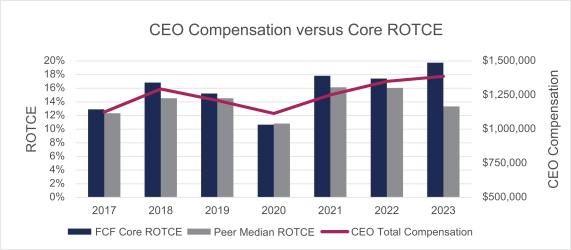Annex A
components thereof), (v) balance sheet measures (including, but not limited to, assets, loans, charge-offs, loan loss reserves, non-performing assets, deposits, investments or any components thereof), (vi) book value; (vii) enterprise risk management measures (including, but not limited to, interest rate sensitivity, capital adequacy, regulatory compliance, asset quality, satisfactory internal or external audits, and financial ratings), (viii) Fair Market Value of the Stock; (ix) strategic initiatives (including, but not limited to milestone or outcome measurements relating to reorganizations, technological changes, mergers and acquisitions, market expansions, new products and services and capital and balance sheet management initiatives), or (x) achievement of balance sheet or income statement objectives. The Committee may determine that certain adjustments shall apply, in whole or in part, in such manner as determined by the Committee, to exclude the effect of any Excluded Items either in the establishment of the Performance Goal or in determining whether the Performance Goal has been achieved. In addition, the Committee may designate other categories, including categories involving individual performance and subjective targets, not listed above with respect to Awards in such circumstances that the Committee determines are in the best interests of the Company.
Performance Goals may be determined either individually, alternatively or in any combination, and subject to such modifications or variations as specified by the Committee, applied to either the Company as a whole or to a business unit or Subsidiary, either individually, alternatively or in any combination, and measured over a period of time, including any portion of a year, annually or cumulatively over a period of years, on an absolute basis or relative to a pre-established target, to previous years’ results or to a designated comparison group, in each case as specified by the Committee. Additionally, Performance Goals may include a threshold level of performance below which no payment will be made, levels of performance at which specified payments will be paid, and a maximum level of performance above which no additional payment will be made. Such performance criteria and objectives constituting the Performance Goals may be particular to a line of business, Subsidiary or other unit or the Company generally, and may, but need not be, based upon a change or an increase or positive result.
(ee) “Performance Share” means an Award of Stock, granted pursuant to Section 9, that is issued subject to the achievement of one or more pre-established Performance Goals and/or other Vesting Conditions, as established by the Committee.
(ff) “Performance Unit” means an Award of Stock Units, granted pursuant to Section 9, the payout of which is contingent on the achievement of one or more pre-established Performance Goals and/or other Vesting Conditions, as established by the Committee.
(gg) “Person” shall have the meaning ascribed to such term in Section 3(a)(9) of the Exchange Act and used in Sections 13(d) and 14(d) thereof, including a “group” as defined in Section 13(d) thereof.
(hh) “Plan” means this First Commonwealth Financial Corporation 2024 Stock Plan, as amended from time to time.
(ii) “Restricted Stock” means an Award of Stock, granted pursuant to Section 8, which is issued subject to the achievement of one or more Vesting Conditions, as established by the Committee.
(jj) “Restricted Stock Unit” means an Award of Stock Units, granted pursuant to Section 8, the payout of which is contingent on the achievement of one or more Vesting Conditions, as established by the Committee.
(kk) “Restriction Period” means the length of time established relative to an Award during which time the Participant cannot sell, assign, transfer, pledge, or otherwise encumber the Stock or Stock Units subject to such Award, and at the end of which the Participant obtains an unrestricted right to such Stock or Stock Units.
|
|
|
|
|
| |
|
FIRST Commonwealth ∎ 2024 Proxy Statement |
|
A-5 |










 C123456789
C123456789






 IF VOTING BY MAIL, SIGN, DETACH AND RETURN THE BOTTOM PORTION IN THE ENCLOSED ENVELOPE.
IF VOTING BY MAIL, SIGN, DETACH AND RETURN THE BOTTOM PORTION IN THE ENCLOSED ENVELOPE.

